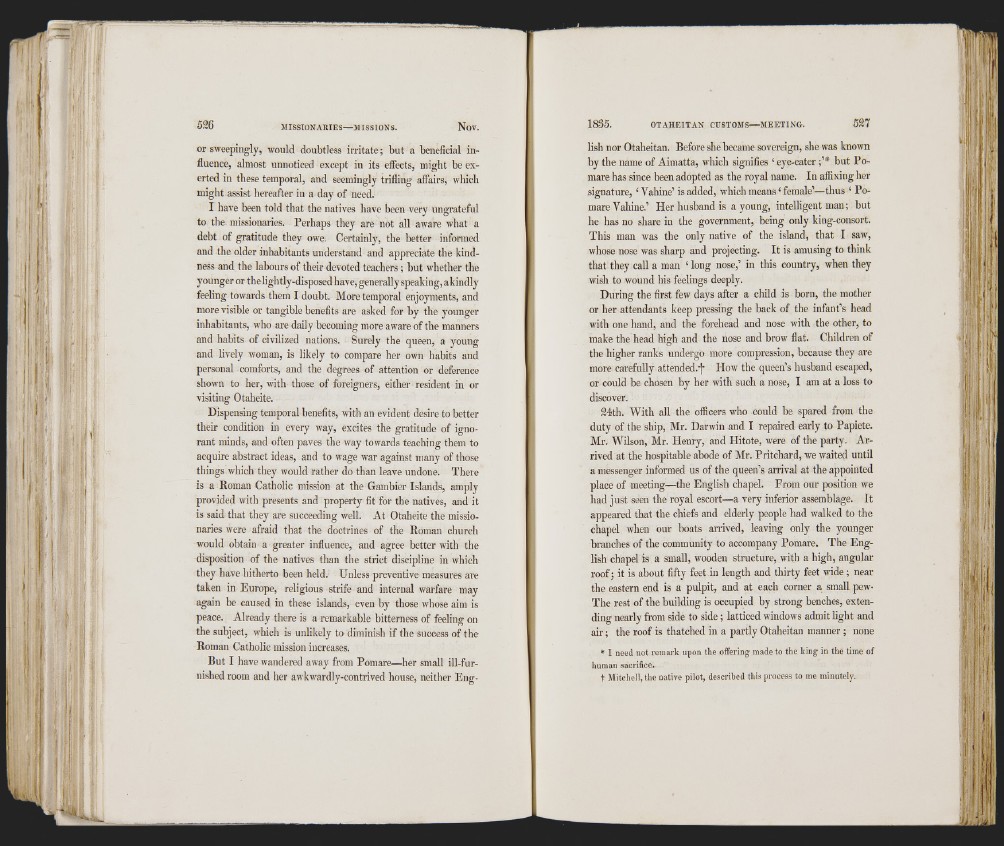
'j à \ I, 0
or sweepingly, would doubtless irritate ; but a beneficial influence,
almost unnoticed except in its effects, might be exerted
in these temporal, and seemingly trifling affairs, which
might assist hereafter in a day of need.
I have been told that the natives have been very ungrateful
to the missionaries. Perhaps they are not all aware what a
debt of gratitude they owe. Certainly, the better informed
and the older inhabitants understand and appreciate the kindness
and the labours of their devoted teachers ; but whether the
younger or the lightly-disposed have, generally speaking, akindly
feeling towards them I doubt. More temporal enjoyments, and
more visible or tangible benefits are asked for by the younger
inhabitants, who are daily becoming more aware of the manners
and habits of civilized nations. Surely the queen, a young
and lively woman, is likely to compare her own habits and
personal comforts, and the degrees of attention or deference
shown to her, with those of foreigners, either resident in or
visiting Otaheite.
Dispensing temporal benefits, with an evident desire to better
their condition in every way, excites the gratitude of ignorant
minds, and often paves the way towards teaching them to
acquire abstract ideas, and to wage war against many of those
things which they would rather do than leave undone. There
is a Roman Catholic mission at the Gambier Islands, amply
provided with presents and property fit for the natives, and it
is said that they are .succeeding well. At Otaheite the missionaries
were afraid that the doctrines of the Roman church
would obtain a greater influence, and agree better with the
disposition of the natives than the strict discipline in which
they have hitherto been held. Unless preventive measures are
taken in Europe, religious strife and internal warfare may
again be caused in these islands, even by those whose aim is
peace. Already there is a remarkable bitterness of feeling on
the subject, which is unlikely to diminish if the success of the
Roman Catholic mission increases.
But I have wandered away from Pomare—her small ill-furnished
room and her awkwardly-contrived house, neither English
nor Otaheitan. Before she became sovereign, she was known
by the name of Aimatta, which signifies ‘eye-eater but Pomare
has since been adopted as the royal name. In affixing her
signature, ‘ Vahine’ is added, which means ‘ female’—thus ‘ Pomare
Vahine.’ Her husband is a young, intelligent man; but
he has no share in the government, being only king-consort.
This man was the only native of the island, that I saw,
whose nose was sharp and projecting. It is amusing to think
that they call a man ‘ long nose,’ in this country, when they
wish to wound his feelings deeply.
During the first few days after a child is born, the mother
or her attendants keep pressing the back of the infant’s head
with one hand, and the forehead and nose with the other, to
make the head high and the nose and brow flat. Children of
the higher ranks undergo more compression, hecause they are
more carefully attended.# How the queen’s husband escaped,
or could be chosen by her with such a nose, I am at a loss to
discover.
24th. With all the officers who could be spared from the
duty of the ship, Mr. Darwin and I repaired early to Papiete.
Mr. Wilson, Mr. Henry, and Hitóte, were of the party. Arrived
at the hospitable abode of Mr. Pritchard, we waited until
a messenger informed us of the queen’s arrival at the appointed
place of meeting—the English chapel. From our position we
had just seen the royal escort—a very inferior assemblage. It
appeared that the chiefs and elderly people had walked to the
chapel when our boats arrived, leaving only the younger
bi-anches of the community to accompany Pomare. The English
chapel is a small, wooden structure, with a high, angular
roof; it is about fifty feet in length and thirty feet wide ; near
the eastern end is a pulpit, and at each corner a small pew-
The rest of the building is occupied by strong benches, extending
nearly from side to side ; latticed windows admit light and
air ; the roof is thatched in a partly Otaheitan manner ; none
* I need not remark upon the offering made to the king in the time of
human sacrifice.
t Mitchell, the native pilot, described this process to me minutely.
%